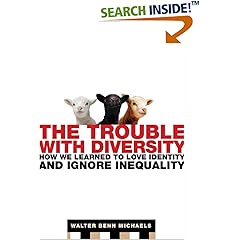 Did you ever notice that MoneyLaw and Classbias contributors do not have much to say about race? A person without similar concerns is Walter Benn Michaels, author of The Trouble with Diversity: How we Learned to Love Identity and Ignore Inequality. Here is the Amazon description:
Did you ever notice that MoneyLaw and Classbias contributors do not have much to say about race? A person without similar concerns is Walter Benn Michaels, author of The Trouble with Diversity: How we Learned to Love Identity and Ignore Inequality. Here is the Amazon description:
If there’s one thing Americans agree on, it’s the value of diversity. Our corporations vie for slots in the Diversity Top 50, our universities brag about minority recruiting, and every month is Somebody’s History Month. But in this provocative new book, Walter Benn Michaels argues that our enthusiastic celebration of “difference” masks our neglect of America’s vast and growing economic divide. Affirmative action in schools has not made them more open, it’s just guaranteed that the rich kids come in the appropriate colors. Diversity training in the workplace has not raised anybody’s salary (except maybe the diversity trainers’) but it has guaranteed that when your job is outsourced, your culture will be treated with respect.
With lacerating prose and exhilarating wit, Michaels takes on the many manifestations of our devotion to diversity, from companies apologizing for slavery, to a college president explaining why there aren’t more women math professors, to the codes of conduct in the new “humane corporations.” Looking at the books we read, the TV shows we watch, and the lawsuits we bring, Michaels shows that diversity has become everyone’s sacred cow precisely because it offers a false vision of social justice, one that conveniently costs us nothing. The Trouble with Diversity urges us to start thinking about real justice, about equality instead of diversity. Attacking both the right and the left, it will be the most controversial political book of the year.What is unique about the Micheals’ book is that he regards himself as writing from the point of view of the political left. He reinforces what many have known for years: The connection between race and especially gender and leftist values is very tenuous.
 About the time I became aware of the Michaels' book, I received an email from a faculty candidate who was not having much luck finding a job:
About the time I became aware of the Michaels' book, I received an email from a faculty candidate who was not having much luck finding a job:“I recently read your . . . J. Legal. Educ. article addressing class bias in law school hiring. . . . Your comments regarding black candidates (p. 122) really hit home, as I am a black candidate who recently entered the teaching market. I come from a rigorously working class background with "nonelitist credentials." In fact, I am the first person in my family to attend college (my father did not even finish high school!).”
The excerpt to which the candidate refers is below
Initially, I thought that most law professors simply could not understand the value of recruiting those who are economically and socially disadvantaged because their own background was so "impoverished." Now I believe that there is a desire (perhaps unconscious) to exclude candidates from less privileged classes. When I observed efforts to recruit minority candidates, I began to realize what was really going on. As most members of law faculty recruiting committees go through the AALS resumés, the "plum" they are looking for is the minority candidate with a string of degrees and a high ranking from an elite law school. Hiring a high-ranking black candidate from Texas Southern Law School or North Carolina Central is a stretch many are unwilling to make. Clearly, a privileged education clinches a position for a black candidate, whereas nonelitist credentials are only sometimes offset by being black. Thus, even in the seemingly honorable effort to obtain some diversity, the aim, as much as possible, is to recruit minority candidates who have been more or less "styled" by seven years at Harvard or Stanford or Pennsylvania. In short, the class bias is so overpoweringly important that it actually undermines ongoing efforts to create faculty diversity through minority hiring. (42 JLEGED 119)Several years have passed since I wrote that but I cannot say that anything has changed.
 The same elitist leanings that exclude less privileged whites seem to apply to African Americans as well. When it comes down to it, the elitists who control legal education have little interest in actual contact with the world outside their own. White and African American candidates who attended elite schools; can drop the right names; have educated parents; are able to discuss the best restaurants in L.A., New York or Boston; and who can pass a political litmus test will he hired over an African American candidate who cannot check off everything on this list. In seeking diversity the search is on for what seems to be the least diverse candidates possible.
The same elitist leanings that exclude less privileged whites seem to apply to African Americans as well. When it comes down to it, the elitists who control legal education have little interest in actual contact with the world outside their own. White and African American candidates who attended elite schools; can drop the right names; have educated parents; are able to discuss the best restaurants in L.A., New York or Boston; and who can pass a political litmus test will he hired over an African American candidate who cannot check off everything on this list. In seeking diversity the search is on for what seems to be the least diverse candidates possible.
1 comment:
You have tons of information that is very valuable and well thought out here.
http://sms100.blogspot.com/
Post a Comment